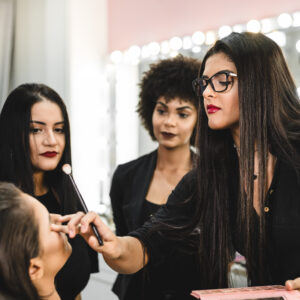July 24, 2024
11 Skills You Didn’t Realize Cosmetologists Learned
What does a cosmetologist learn in school?
You might think you know the answer, but there’s more going on than you probably realize. Beyond the technical skill to pull off haircuts and beauty treatments, stylists have a wealth of knowledge that often goes unnoticed. From chemistry to psychology, the best cosmetologists have a surprisingly diverse education.
Here are 11 things you may not realize cosmetologists learn in beauty school.
Practical Cosmetology Skills
1. Scalp and Hair Care
It makes perfect sense when you think about it — to get gorgeous hair, you need to have a healthy foundation. Cosmetologists learn about the complexities of hair types, scalp conditions and the most effective treatments to set their clients up for success. We also use these skills to diagnose any issues like dandruff, hair loss and irritation that keep clients from looking and feeling their best, and then suggest the best available solutions for both men and women.
2. Facials
Getting a facial feels great, but they’re not just about being pampered. Part of the Xenon Academy cosmetology course is dedicated to training students to use these skincare treatments to their full potential. Cosmetologists learn about different skin types and conditions so they can tailor their recommendations to unique clients. A 17-year-old preparing for prom will likely benefit from a different treatment than a mother who wants to look best at her daughter’s wedding! (For education specifically focused on skincare, our esthetics program goes even more in-depth.)
3. Massage
People often think of massages as strictly for tired, aching muscles, but they can have a massive impact above the neck, too! Scalp massages support hair health and growth (not to mention, they feel nice). Being able to promote blood circulation to hair follicles is key for cosmetologists who want to provide the best possible results.
We don’t often think about the muscles in our faces. But they have a massive impact on our lives — for example, do you need to relax your jaw right now? Facial massages soothe tension, even when we don’t realize we’re holding it there. Cosmetologists and estheticians learn about the best ways to enhance your well-being, from boosting lymphatic circulation to pure relief.

4. Makeup
Far from the days of playing with your mom’s lipstick, cosmetologists are educated on the best ways to transform clients with the power of makeup. From everyday application to special occasions, they learn a range of techniques to meet clients’ preferences and needs.
5. Manicures and Pedicures/Nail Enhancements
Manicures and pedicures are about more than your nails looking nice: they’re about the health of your hands and feet. Details like cuticle health, nail strength and common nail disorders are part of a comprehensive understanding necessary to deliver professional nail care services. Aesthetic enhancements are the next step!
6. Rules, Regulations and Safety
When you’re in a salon, you should always feel safe. There are tons of safety regulations, state laws and strict rules in place to protect both clients and employees, and we take them very seriously. This even expands to education about sanitation and infection control! Making clients feel good is a huge part of cosmetology, but the pros spend a lot of time making sure they also stay healthy.
7. Anatomy
To truly understand how to give clients their desired results, cosmetologists have to understand specific information about the anatomy of skin, hair and nails. Even understanding facial anatomy is important for techniques like makeup application and facial treatments!
8. Chemistry
Cosmetics, hair products and skincare are all made up of chemicals. Understanding how they interact with each other, and which are suitable for different skin and hair types helps to make sure everything is compatible. Specific treatments like dye, bleach, perms and chemical relaxers are doubly impacted by how well cosmetologists understand the chemistry involved and how to troubleshoot any reactions.

Business Skills for Cosmetologists
9. Professional Ethics
The relationship between cosmetologists and clients is one of our favorite things about our work. To protect it, we need to make sure we also learn about the necessary ethics to uphold trust and industry standards. Even something as small as making sure clients are willing to do the daily styling required to get the same look at home drastically impacts satisfaction and happiness.
10. Client Service
It’s true that there’s a certain kind of person who really excels as a cosmetologist: someone who enjoys both the artistry and working with other people! But there are certain skills that require additional education, and we want to make sure that our cosmetology grads have all of them. From taking the time for thoughtful personalized consultations to professionalism around punctuality and respectful communication, we want to deliver on both client expectations and high standards of service. And to give them the experience they want, we strive to understand their inner psychology.
11. Management and Salesmanship
When people think about a career in cosmetology, they usually picture someone who works at a typical salon. But what if you want to advance past that? As part of our curriculum, we teach management and sales skills for cosmetologists interested in managing their own salon or spa, leading a team or excelling in beauty sales roles. Finding ways to elevate leadership abilities, business acumen and promotional know-how while maintaining client satisfaction? It can feel overwhelming, but it’s a game-changer for those ambitious enough to tackle it.
To be successful in the beauty industry, we have to embrace continuous learning and improvement. This is a dynamic, fast-paced field from the very beginning — we set it up that way to help our future cosmetology stars shine!
Ready to get started on your future in the beauty industry? Enroll now and start your journey to a career in cosmetology!